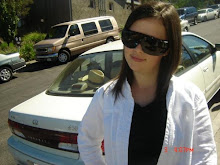I don't like to talk politics very much on the blog. I don't want to pretend to be the most well-informed person on current events and at the end of the day, this is for fun. It's not meant to be too weighty. But if you know me or have been reading for awhile, you're probably aware that I lean to the left. Some might say bleeding heart liberal. For the project, I have read some political books:
The Audacity of Hope (definitely toward the left) and
Game Change (more toward the left than the middle). So in the interest of fairness, I always intended to read something non-fiction that was from a conservative standpoint. Fair's fair, right? I wasn't sure how to start looking for something, though. Most of the conservatives that pop up on my radar don't appeal to me because they don't seem to be interested in a rational dialogue -- keep in mind, this mainly refers to people like Glenn Beck. I know there are serious-minded conservative voices out there, though; I just can't hear them over the noise of Beck et al. So when I saw
Defining Conservatism on the new non-fiction shelf at the library, my interest was piqued. Maybe this was just the thing that I had been looking for?
Defining Conservatism is a passionate appeal to
a political movement that is re-examining its identity as Republicans set their sights in 2010 and beyond. A dedicated young conservative, Jonathan Krohn presents
conservative philosophy's basic tenets in this
remarkably earnest and impeccably reasoned primer. This book,
clear and informative, is a history lesson, a manifesto, and a roadmap for the future. It is Krohn's rallying call to action not just for conservatives, but
for anyone interested in the political state of our nation. In
Defining Conservatism, Krohn challenges "government expansionists," whose faith in Washington and the basic pillars of government exceeds their faith in the individual. At the same time, he boldly stakes out
four unshakeable principles for conservatives to rally around:
Respect for the Constitution
Respect for human life
Belief in minimalist government
Insistence upon personal responsibility
Anyone interested in the basic differences between conservative and liberal thought will find Krohn's writing at once compelling, informative, intelligent, and -- for those who do not agree with him -- controversial. Defining Conservatism is a must-read for anyone who is interested in the basic principles upon which the United States was founded, and perhaps most importantly, for anyone who is concerned with the future of this country.
Summary taken from the book jacket copy.
This book was in no way, shape or form what I was looking for. I
bolded parts of the book jacket copy to indicate what must have appealed to me as I read it while at the library. I think I must have been skimming, rather than really reading. I brought the book home with me thinking that I would be reading about those four basic tenets of conservatism, which I actually don't find much fault with. (Seriously. At the root, we're not that far apart.) I thought the book would be accessible to liberals, explaining conservative principles at least partly in an attempt at a greater understanding between the two parties.
Krohn does go into detail explaining those basic principles. But I found that at every opportunity, he took pleasure in also explaining why liberals (referred to in every instance as "government expansionists") were wrong -- and dangerous. I found his writing to be obnoxious and offensive. One of his assertions is that liberals have no moral compass. I think he puts it as conservatives believe natural law and morals to be inflexible, while liberals change their morals based on context of situations -- thus having no true (read: inflexible) morals. That's the best way that I can paraphrase, something may get lost in translation. I wrote down a quote about morals, maybe it will give you an idea of how he writes on the topic:
"The so-called tolerant left claims that in order to have tolerance, one must first and foremost deny morality a stake or even a claim in society."
I have never been so frustrated in my life. The book is about 170 pages long, and I cried for most of the second half. I could rant and rave about what Krohn said and the rude way he said it, but it's really my fault for now knowing what I was getting into.
I want to wrap up this post with a couple of quotes from President Obama's commencement speech at the University of Michigan, which took place earlier this year. As I said above, I don't have a problem with the basic ideas of conservatives. I don't feel so far apart from them to preclude understanding or cooperation. But I think we have different ways of looking at things, and the quotes below express (more eloquently than I could) some ideas that reading Defining Conservatism stirred up.
"It was the first Republican President, Abraham Lincoln, who said the role of government is to do for people what they cannot do better for themselves."
"...government shouldn't try to dictate people's lives. But it should give you the tools you need to succeed. Government shouldn't try to guarantee results, but it should guarantee a shot at opportunity for every American who's willing to work hard."



























